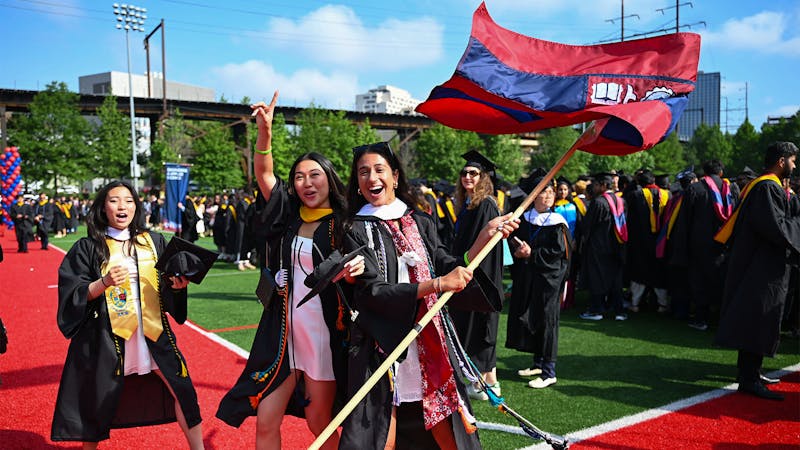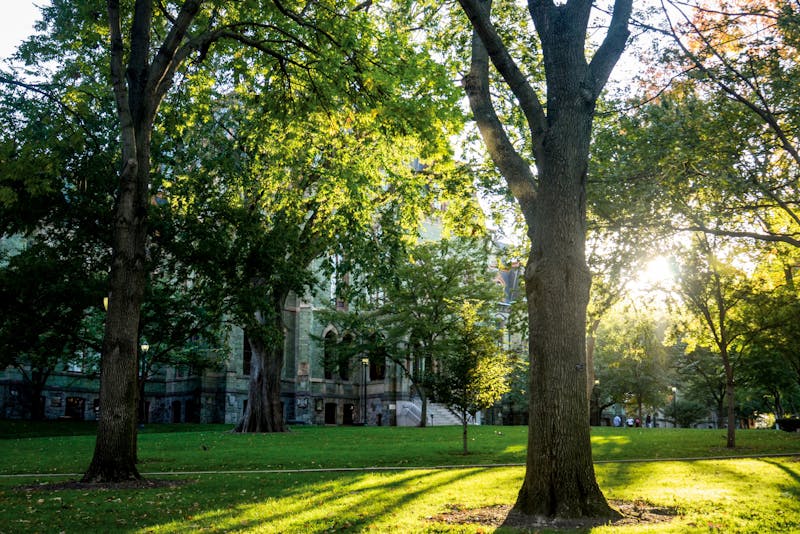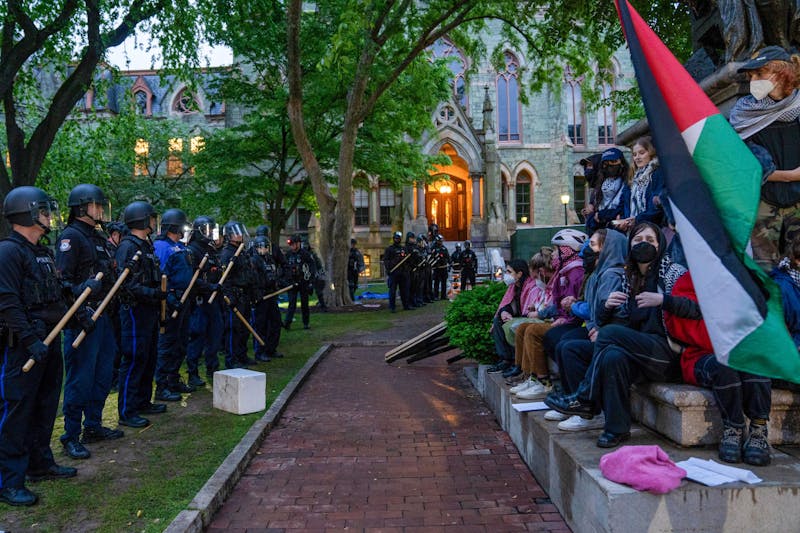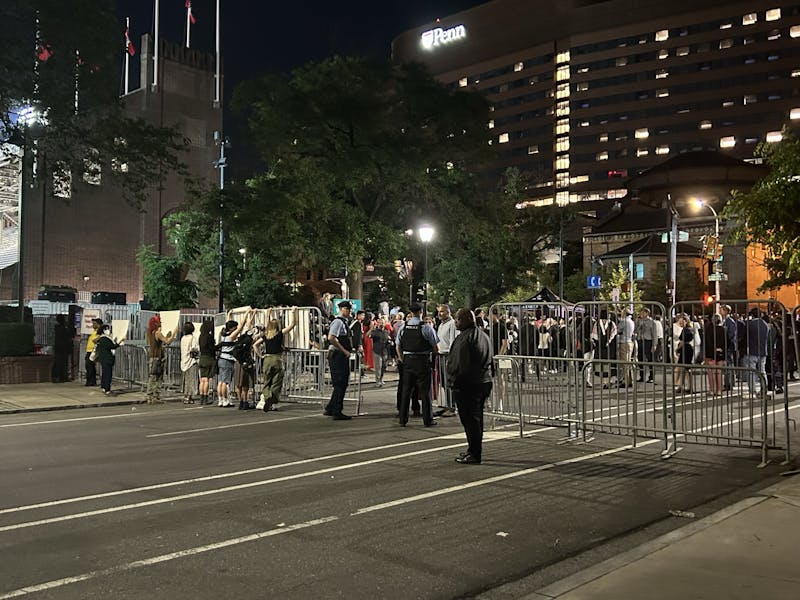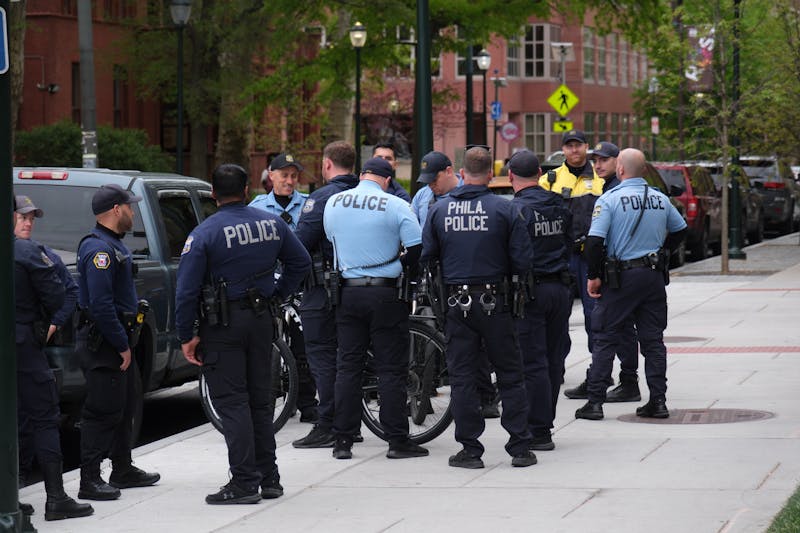
Graduates of the Class of 2024 gathered for the University’s 268th Commencement ceremony on Monday morning, marking Interim Penn President Larry Jameson’s first Commencement since assuming the role and capping a turbulent year on campus.
Approximately 6,000 graduate and undergraduate students arrived at Franklin Field shortly after 10:15 a.m. after taking part in a procession from Penn Park. The ceremony featured remarks from Jameson and this year’s Commencement speaker, Siddhartha Mukherjee, a professor of medicine at Columbia University and Pulitzer Prize-winning author. Commencement occurred without interruption after an increase in security measures following weeks of activism on campus.
The increased security followed weeks of campus protests, including the two-week encampment on College Green and three Penn seniors being barred from entering the College of Arts and Sciences Graduation Ceremony Sunday night. All graduates and guests were required to go through an airport-style security screening, and bags were prohibited in Franklin Field except “small wallets and clutch-style purses.” Three officers from the Philadelphia Police Department and six officers from Penn's Division of Public Safety were also stationed outside Franklin Field during the ceremony.
In a message to "[p]arents, [f]amilies, and [f]riends" sent on May 8 and obtained by The Daily Pennsylvanian, the Office of the University Secretary outlined several additional security measures for Commencement, including PennCard checks for all graduates to allow them to enter the field.
“Guests may not bring artificial noisemakers (including airhorns or bullhorns), signs, posters, flags, or golf umbrellas (small collapsible umbrellas only),” the statement read.
Before the ceremony began, an announcement was made on Franklin Field to “remind” those in attendance that Commencement is “more than a ceremony, it is a personal milestone achieved through years of hard work.”
“In the event of a disruption, security personnel will engage the individual or group that is responsible. If the disruption continues, they will be escorted out,” the announcement, which immediately preceded the entrance of University officials, said.
University Board of Trustees Chair Ramanan Raghavendran opened the ceremony, followed by College senior Megan Higgins performing the national anthem. University Chaplain Charles Howard led a prayer and commended the graduating class before Jameson took the stage and addressed the audience. Jameson indirectly touched on Penn’s eventful year in his remarks, acknowledging the “hard year” it has been “for the world and for Penn.”
In his second set of remarks, which closed the ceremony, Howard mentioned that the idea of canceling Penn's Commencement — following the example of peer institutions — had been frequently broached in recent weeks, but that administrators ultimately decided to keep the ceremony as scheduled.
“There’s a lot of fear in the world right now, not unjustifiably so. War is frightening and heartbreaking,” Howard said. “But living in fear, that’s no way to live. Don’t let fear keep you from being your best selves … from celebrating the special moments in life.”
Six honorary degree recipients were honored along with the graduating Class of 2024 — a practice upheld by the University since 1757. This year’s recipients included physicist and mathematician Ingrid Daubechies, pioneer of optogenetics and hydrogel-tissue chemistry Karl Deisseroth, co-founders of Philadelphia International Records and “The Sound of Philadelphia” Kenneth Gamble and Leon Huff, artist and designer known for the Vietnam Veterans Memorial Maya Lin, and Mukherjee, who delivered the main commencement address, titled “Four Offerings.”
Mukherjee discussed how every graduation is connected to the abstract transitions of birth and death, recounting how his experiences working with terminal patients as a physician-scientist have offered him a glimpse of what they most prioritize in anticipation of their final moments.
“Every person that I’ve met at this moment of transition wanted to make four offerings. Two sentences and two questions. I want to tell you that I love you. I want to tell you that I forgive you. Would you tell me that you love me? Would you give me your forgiveness?” he said to the graduates and audience.
He urged students to carry this as a mantra in their transitions from their old “deaths” to their new “beginnings,” and to imbue these terms, which he labeled as having become “meaningless, outdated platitudes” in the current world, with new meaning. He said that this was their new responsibility as graduates, as well as not forgetting to vote.
Following Mukherjee’s address, deans of Penn's 12 undergraduate and graduate programs conferred degrees onto students prior to final closing remarks by Jameson and Howard.
“This has been a remarkable and unforgettable day,” Jameson said to the Class of 2024. “Thank you all.”
Although the ceremony occurred without any form of disturbance, students showed pro-Palestinian solidarity in subtler ways. At least 20 students wore keffiyehs, and some waved them or held them up when they were on camera. One senior, who wore a traditional Middle Eastern keffiyeh over her graduation robes, told The Philadelphia Inquirer that her decision to do so was to “show solidarity” with the protestors.
“I would love for the encampment to still be here, even though it's my graduation. I can still graduate. There are bigger things in the world,” she told the Inquirer.
Other attendees wished the encampment had ended sooner, including 1962 College graduate Stephen Goff, who also served as the former managing director of the Annenberg Center for the Performing Arts.
“I just don’t understand,” Goff told the Inquirer. “Whatever side you’re for, you’re not accomplishing anything, in my mind. What do you expect to do? Don’t just get out there and yell for whatever reason.”
Last Friday, pro-Palestinian activists attempted to occupy Fisher-Bennett Hall at 34th and Walnut streets and were met with an immediate response from Penn and Philadelphia Police officers, who arrested 19 individuals — seven of whom are Penn students.
A week prior, on May 10, Penn Police officers in riot gear — with the assistance of Philadelphia Police — arrested 33 individuals at the Gaza Solidarity Encampment.
The arrests came 16 days after pro-Palestinian activists pitched approximately 40 tents on College Green, beginning an encampment that would disband until their demands of the University were met. The group demanded that Penn divests from corporations that benefit from the ongoing Israel-Hamas war, Israel’s occupation of Palestinian land, and Israeli institutions committing “scholasticide.”
There have also been instances of pro-Palestinian solidarity and protests during several smaller schoolwide commencement ceremonies.
Three seniors, who were previously placed on mandatory leaves of absence due to their involvement in the Gaza Solidarity Encampment, were barred from entering the ceremony after a lack of response to communication from the Center for Community Standards and Accountability, according to a University spokesperson.
The spokesperson wrote in a statement to The Daily Pennsylvanian that the three seniors' disciplinary cases were “expedited through the CSA process,” and that “letters notifying these students of the findings were delivered on Friday.”
“Because the students have not yet responded to the letters to resolve their cases, they remain on mandatory temporary leave and were not permitted to participate in the College of Arts and Sciences graduation ceremony,” the spokesperson wrote.
During the College ceremony, dozens of students wore keffiyehs, and several carried flags and signs across the stage when their names were called to receive their diplomas.
In addition, an open-letter “petition and phone action” posted on X — the platform formerly known as Twitter — Monday morning addressed to Jameson and Provost John Jackson Jr. urges the University to drop all disciplinary charges and sanctions against students involved in the Gaza Solidarity Encampment in order to “not … set a precedent that will irrevocably damage Penn’s ability to operate as an institution of higher education.”
The petition cites Penn’s Guidelines on Open Expression, specifically the protection of University community members’ rights to “assemble and demonstrate peaceably in University locations,” where “demonstrations” are understood as having the “intent to express a particular point of view in a manner that attracts attention as in protests, rallies, sit-ins, vigils, or similar forms of expression.”
It goes on to claim that students at the encampment did not “harm, threaten, injure, or directly disrupt” the activities of the Penn community — citing non-engagement and de-escalation policies with counterprotesters; stressing nonviolence, care, and respect in the encampment; and use of removable materials like chalk and flags on the Ben Franklin statue so as to not cause permanent structural damage to campus. The letter then accuses the University of breaking the Guidelines on Open Expression by using force to dismantle the encampment on May 10 and doing so in a way that “significantly disrupted student life and campus safety.”
An Instagram account titled “SP2 Students for Liberation” also announced that they were passing out “cap decorations, keffiyehs, & pins” on Saturday. At the ceremony for the School of Social Policy & Practice Saturday evening, several students wore keffiyehs and graduation caps with “Disclose, Divest, Defend” pasted on the top.
At the School of Arts and Sciences graduate ceremony on Friday, Daniel Morales-Armstrong — receiving a Ph.D. in Africana studies and history — mentioned the Israel-Hamas war in his speech.
“What will the page about this moment say about how you responded to the interconnected, white supremacist, imperial, and hyper-militarized violence waged on the people of Gaza?” Morales-Armstrong asked.
The Daily Pennsylvanian is an independent, student-run newspaper. Please consider making a donation to support the coverage that shapes the University. Your generosity ensures a future of strong journalism at Penn.
Donate







